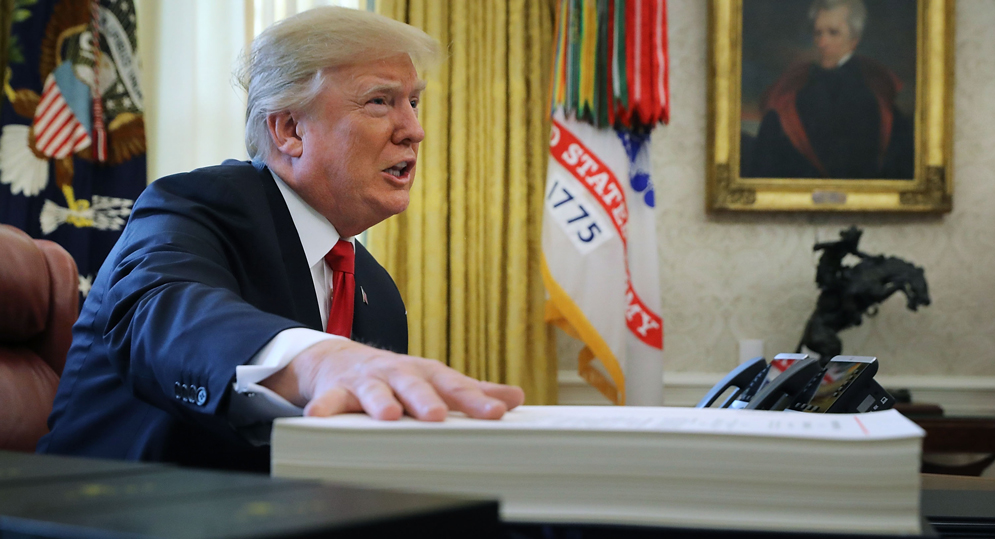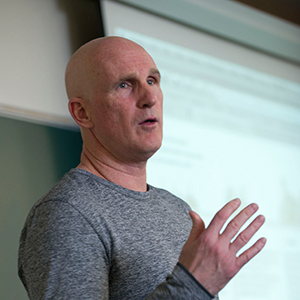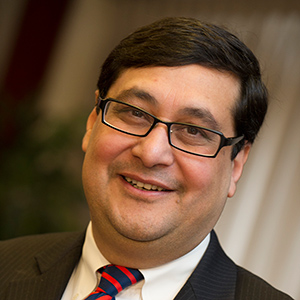One Year In, How’s Trump Doing?
BU experts on a wild first year

Donald Trump’s first year in office disappointed many BU experts for its policies, but they say he’s accomplished much of what he wanted to do. Photo by Chip Somodevilla/Getty Images
Donald Trump, the most un-clichéd of presidents, nevertheless conjures a cliché: what a difference a year makes. What do Americans think of the president now? A recent NPR/PBS NewsHour/Marist poll finds that by a 53-to-40-percent margin, Americans consider Trump’s first year a failure. Shortly after the 2016 election, we asked some BU experts for their take on what President Trump might do. With the first anniversary of his inauguration tomorrow, we again consulted them, for their assessment of Trump’s first year. Their answers follow.

Trump has been tremendously successful. Aided by a Republican Congress who traded their power to fulfill their highest priorities, he moved his agenda through executive action rather than legislation. He slowed, stopped, or rolled back what even the middle, not to mention the left, would see as progress on core areas of public policy and values: civil rights, civil liberties, protecting the environment, taking pride in American racial and religious diversity, placing a hand on the scale to address the imbalance of power between individuals and communities versus powerful corporations. He speeded erosion of fundamental trust in American democracy, which, in turn, erodes its functioning, to give himself more power. He made our government more clientelistic and autocratic, reflecting his preferred governance style as the CEO of a particular kind of private family company. He gave America’s support to some other world leaders who operate that way. He gave voice to the white people who believe they have been denigrated by racism and to Christians who believe the United States is and ought to be a Christian country. He rolled back the size and impact of the federal government. He restructured the tax system away from redistributive policies. He changed the face of many judgeships, including in the Supreme Court. It would take a long time to undo his accomplishments.
He scored some notable losses. He caused the United States to lose power and respect. He personally provoked an uprising of women who refuse to continue being silent in the face of harassment. He sparked an upsurge in political engagement among Democrats. They will contest more seats at all levels than they have for a long time, which will spread Republican support money more thinly than it has had to be in some time. More of these candidates than ever will be women, people of color, and LGTBQ people. But Democrats should not plan their victory parties yet. The foremost determinant of how people vote will remain their own partisan identification. Unless lots of Republicans abandon their partisanship identification, unless the youngest generations enter the electorate largely as Democrats (don’t forget those young Charlottesville white supremacist marchers) and vote at levels never seen before, the outcome of the election is far from determined.

How could I have been so wrong? My November 2016 forecast seems horribly dated, almost upside down. In the immediate aftermath of Trump’s surprising victory, I anticipated that control of Washington would paper over divisions in the Republican Party and plunge the Democrats into a frenzy of “finger-pointing, soul-searching, and recriminations.” Instead, concerted resistance to Trump’s agenda has unified the opposition, muted internecine conflict among Democrats, and energized the party’s base. Meanwhile, even though Republicans largely rallied around Trump’s appointments and behind his tax bill, the GOP has purged many of its anti-Trump voices (the premature retirements of Senators Jeff Flake and Bob Corker and more than a dozen moderate House members), split over the nomination of Roy Moore [the Republican loser in Alabama’s December Senate race], the influence of former White House aide Steve Bannon, the presence of transsexuals in the military, and the deduction for state and local taxes.
Still, the question I raised 14 months ago about the shifting electoral foundations of American politics remains relevant. Since 2010, Republicans have far outperformed expectations in the industrial Midwest. In those one-time manufacturing centers, Republicans successfully exploited disaffection among less educated, less well-off whites, and in states like Pennsylvania and Wisconsin, used control of the state legislature to restructure the electorate in their favor. That turned the tide for Trump in 2016 and helped explain why Republicans (who lost the popular vote in the presidential race and won far more Congressional seats than their overall share of votes would suggest) retain majority control of all governmental branches despite their minority status in the electorate. The political riddle for 2018 is whether the intensity and unity of anti-Trump forces is sufficient to overcome the structural advantages the GOP enjoys and win Democrats control of one (or both) houses of Congress.

Kecia Ali, professor of religion, CAS
Sadly, my prediction about the pervasive anti-Muslim bias of this administration, and especially the current president, has been borne out. He retweeted false anti-Muslim propaganda from Europe’s far right, ordered discriminatory Muslim travel bans, and has repeatedly excused violent white supremacists. Attacks on Muslims, and those perceived to be Muslim, are at an all-time high, and some are undertaken explicitly in the president’s name. My mosque was among those receiving a letter declaring that Trump “is going to do to you Muslims what Hitler did to the Jews.” Popular resistance and legal challenges to anti-Muslim policies have been important, but are challenging to sustain in the wake of so many concurrent threats to immigrants, health care, disability rights, net neutrality, reproductive justice, workers’ protections, the climate, Native lands, and more. We have our work cut out for us.

Readers can prepare for me a heaping bowl of crow to eat, with a side of humiliation. In the spirit of the glass-half-full, I predicted in this space a year ago that candidate Donald Trump’s attacks on the news media wouldn’t carry over into his presidency. Beneath all that bluster, all that showmanship, must lie a foundation of rationality, I reasoned. When he no longer needed to win attention, insult rivals, or beat up the reporters covering him to get the crowd’s applause, surely he would behave like the executive leader his voters thought he could be. Gulp…
That prediction didn’t survive Trump’s first day in the White House, when he blasted coverage of his inauguration as “fake news” because his own “alternative facts” (a term coined by aide Kellyanne Conway) proved that his was the most watched inauguration in the nation’s history. The anti-press tsunami rolled forward from there: he has expressed the wish to edit the First Amendment, at least as it pertains to the press; loosen the news media’s legal defenses, rendering the press vulnerable to lawsuits (his lawyers recently threatened to sue the publisher of Michael Wolff’s Fire and Fury); and still come the unrelenting tweets dismissing every report not to his liking as fake.
Not since Richard Nixon’s attempt to halt publication of the Pentagon Papers and his infamous enemies list has a president demonstrated such unrestrained hostility toward the Fourth Estate. But even Nixon didn’t mock the news media as Trump is doing with his “Fake News Awards, those going to the most corrupt & biased of the Mainstream Media…”
The press, far from being cowed by these attacks, is energized by them. And it isn’t likely that Trump will hold his fire, not as he becomes desperate to shake the scandals and questions engulfing him and to stop his slide in public esteem (already the lowest in modern history).
I predict that this animus will not only continue through 2018, but will grow even uglier and more unhinged. And if I get this prediction as wrong as I did my last one, I will be a very happy guy.

The Trump administration’s actions on energy, climate, and sustainability have unfolded pretty much as expected: science-based decision-making to promote public well-being has been replaced by promotion of the financial interests of a narrow swath of corporations. Most of the nation’s key institutions that protect human health and the environment—the Environmental Protection Agency and the Departments of Energy, Interior, and Agriculture—are headed by individuals who openly disdain science and who personally benefit from the extraction of natural resources. These agencies continue to deny climate change, relax drinking water standards, weaken safeguards to prevent worker exposure to harmful chemicals, purge scientific content from their websites, restrict the communication of their staffs (prohibiting the terms “evidence-based” and “science-based”), and create a hostile work environment for staff scientists.
Across all federal agencies, the Trump administration has weakened the advisory committees that provide scientific advice to the government and has left a large number of positions unfilled. The results are policies that will harm well-being immediately and well into the future. Examples include scrapping the Clean Power Plan, opening the Arctic National Wildlife Refuge and federal waters to oil and gas exploration (except off the coast of the key swing state of Florida), canceling a study of health risks to residents who live near mountaintop removal coal mine sites in the Appalachian Mountains, canceling a rule to prevent endangered whales and sea turtles from becoming entangled in fishing nets, repealing emission standards for trucks, and shrinking the EPA budget. Trump’s actions no doubt will resonate with his base; how they will play out in future election cycles is unclear, because there is widespread and deep support in American society for policies that promote clean air and water and that conserve important natural resources and environmental amenities.

Unfortunately, 2017 may have been the year that America stopped trying to be great, at least in its international relations.
Donald Trump has led a truly remarkable—even dramatic—turnaround from America’s being a great power that shapes as well as leads the international system to seeing itself as victim of an unfair international order. Nowhere was this shift more apparent than in Trump’s speech to the United Nations in November, when he invoked the word “sovereignty” 21 times. Such is the rhetoric of the weak, not the great.
It was already evident that Trump’s America is not isolationist as much as it is unwilling to accept the mantle of global leadership. US abdication on climate change was not news. But the fact that the rest of the world did not care, react, or think it consequential was a sure sign that American power and influence ain’t what they used to be.
Then Trump began digging his own hole deeper.
In Afghanistan, where the United States is now embroiled in a war longer than the Soviet Union had been and controls even less territory, Trump’s strategy is to coerce Pakistan and coo to India to step in to do more. In Syria, Russia and Turkey are left to take the lead. In Iraq, the Kurds, our staunchest allies, feel betrayed. Having looked the other way on Qatar and then Lebanon, the Saudis stand anointed as the new sheriff of the Arabian Gulf. In Russia, of course, everything has become subservient to Trump’s own complicated relations.
Things are clearly not going well when an American president cancels a visit to London because he is not welcome there. But that’s not as bad as the entire continent of Africa—54 countries—demanding a formal apology for having been disrespected with vulgarities. And after the Pope, as well as nearly the entire General Assembly of the United Nations, reprimands your president for his decisions.
Of course, there is also the schoolyard brawl with North Korea. But there, at least, we now know that Trump’s nuclear button is bigger than Kim Jong-un’s.
We already knew that it is not easy for any nation to become great, let alone become a great power. We may now be learning how easy it is to stop being so.

Comments & Discussion
Boston University moderates comments to facilitate an informed, substantive, civil conversation. Abusive, profane, self-promotional, misleading, incoherent or off-topic comments will be rejected. Moderators are staffed during regular business hours (EST) and can only accept comments written in English. Statistics or facts must include a citation or a link to the citation.